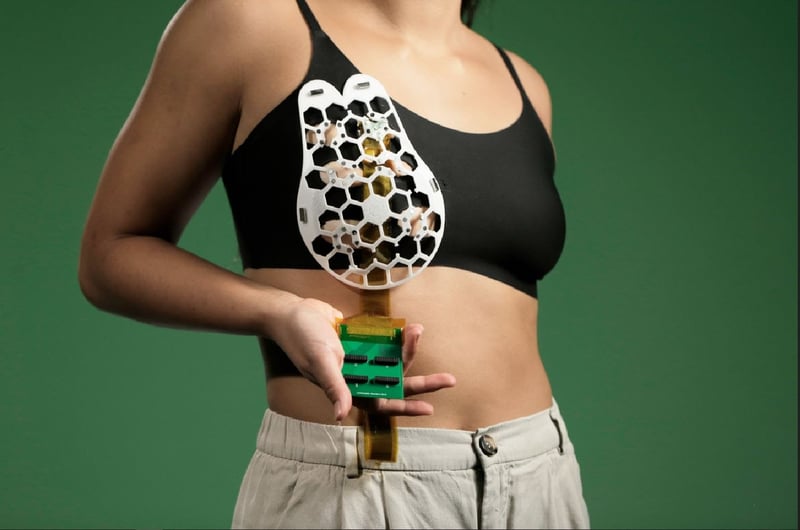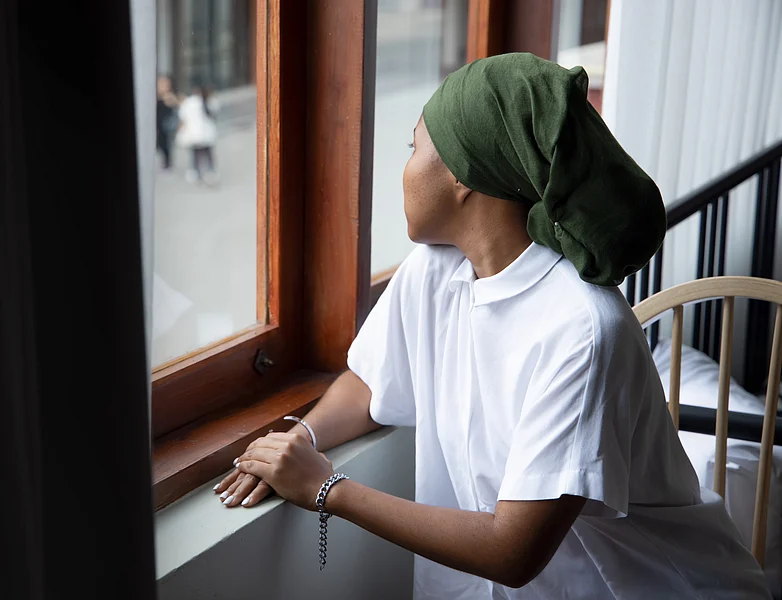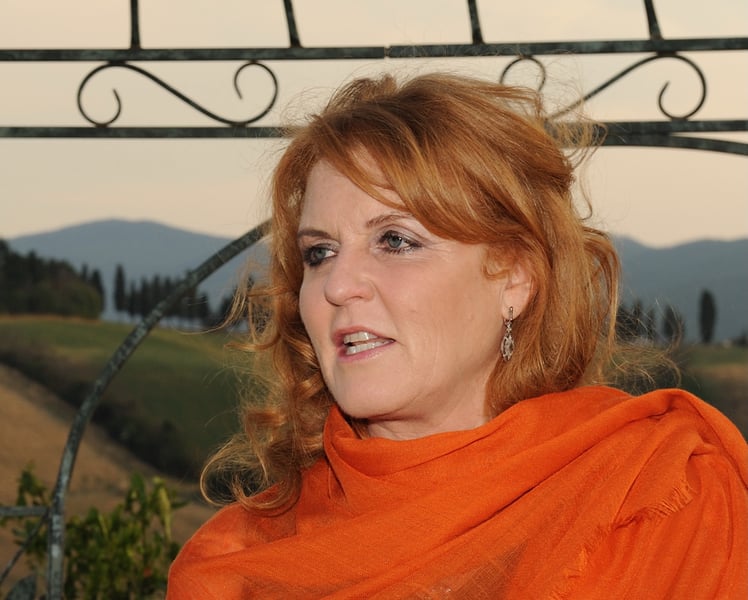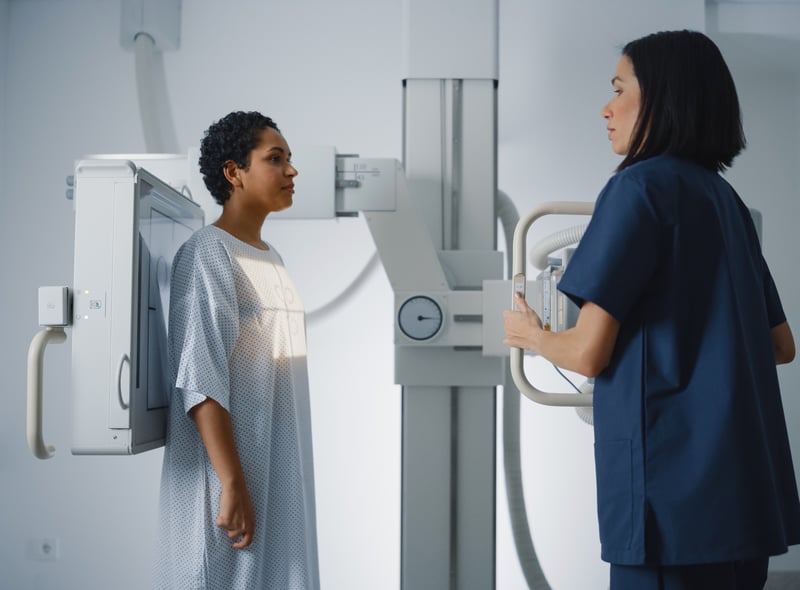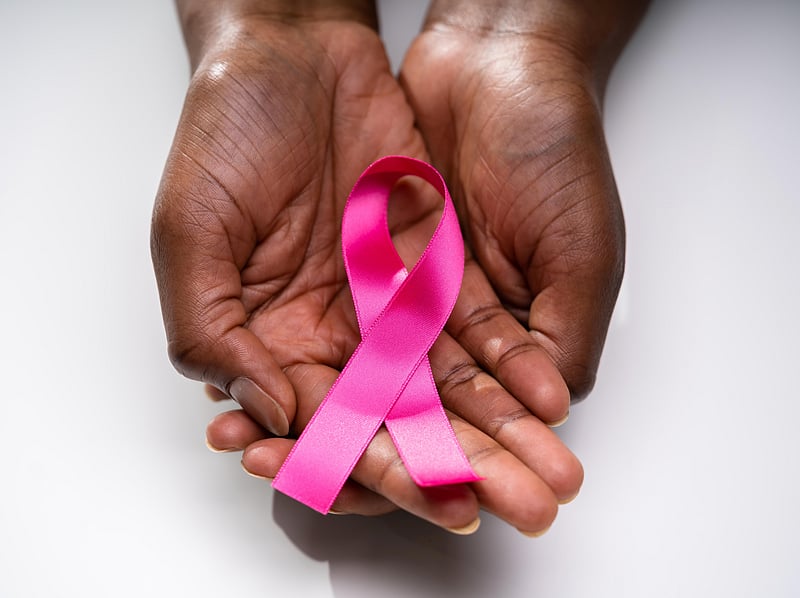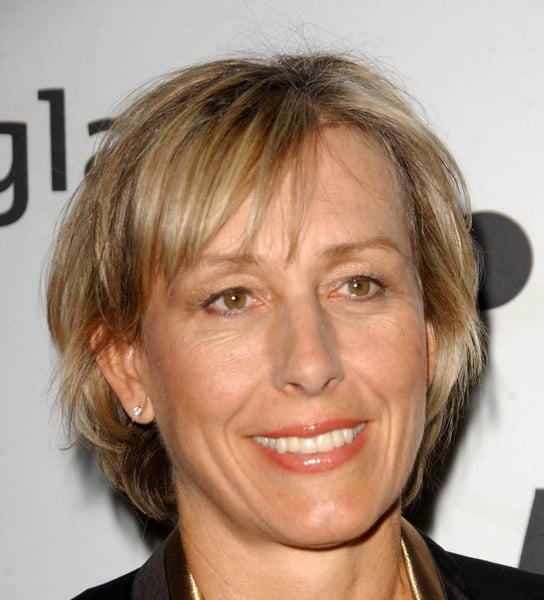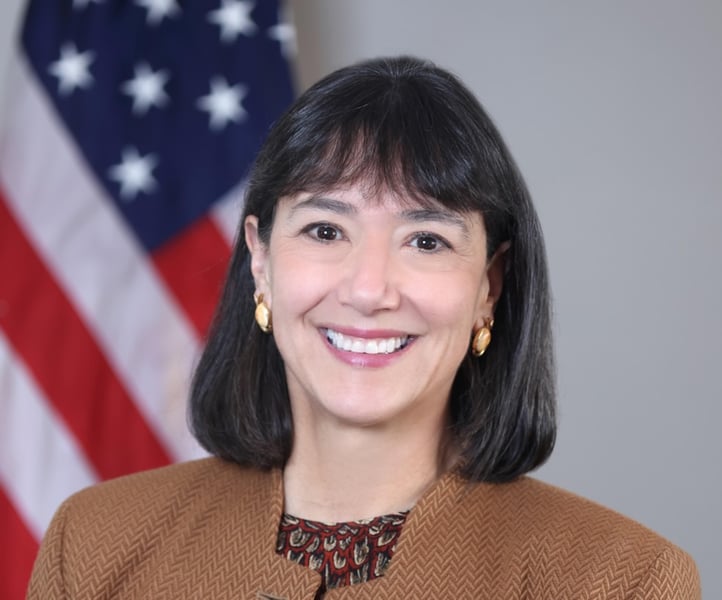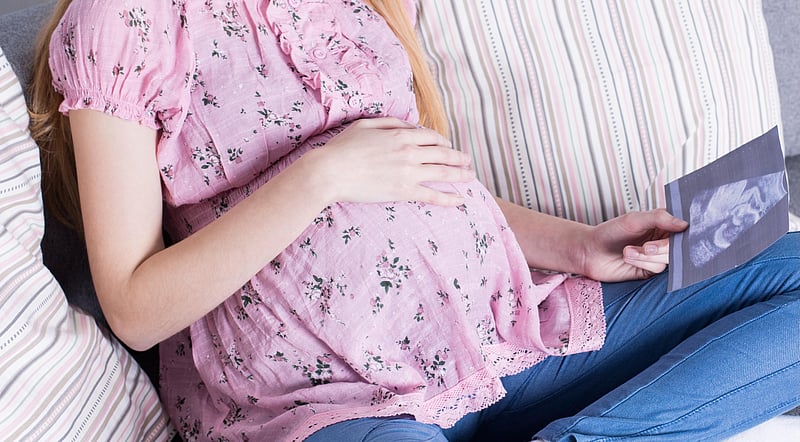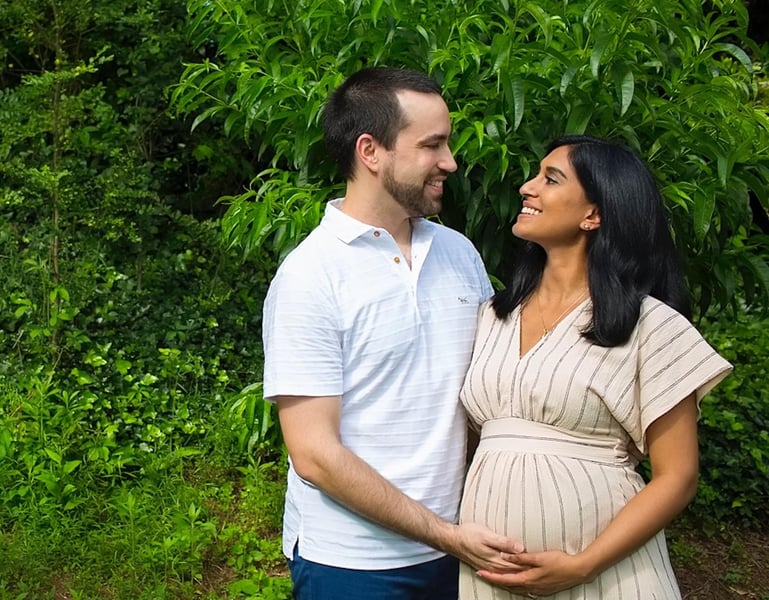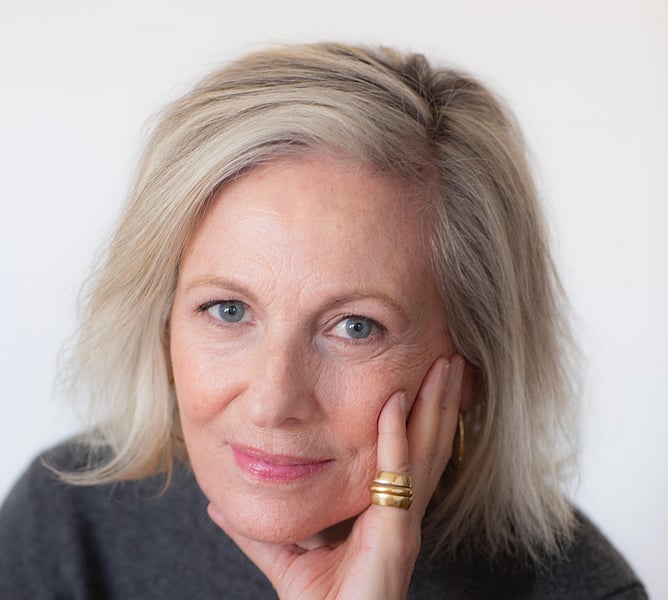Get Healthy!
350 Results for search "Cancer: Breast".
Health News Results - 350
Artificial intelligence (AI) programs can safely be used to help radiologists review mammogram images and detect breast cancers, early results from an ongoing clinical trial show.
A single radiologist aided by AI wound up detecting about 20% more breast cancers from mammogram images than two radiologists working together, according to a report in the August issue of The Lancet Oncolog...
- Dennis Thompson HealthDay Reporter
- |
- August 2, 2023
- |
- Full Page
Scientists have developed a wearable ultrasound patch that might eventually allow women to monitor themselves for early signs of breast cancer in the comfort of their home.
The achievement, reported July 28 in the journal Science Advances, is the latest in a broader research effort to make wearable ultrasound a reality.
The hope is to one day use such portable technology t...
- Amy Norton HealthDay Reporter
- |
- July 28, 2023
- |
- Full Page
Sarah Ferguson has undergone treatment for breast cancer, she announced on her podcast.
The Duchess of York, 63, had a mastectomy after the diagnosis and the surgery was successful, her rep confirmed Sunday, People magazine reported.
"The Duchess is receiving the best medical care and her doctors have told her that the prognosis is good. She is now recuperating with her f...
- Cara Murez HealthDay Reporter
- |
- June 26, 2023
- |
- Full Page
Metastatic breast cancer can be a daunting diagnosis, but the prognosis has improved somewhat with advances in treatment.
Also known as stage 4 breast cancer, metastatic cancer is defined as the spread of disease beyond the local breast and nearby lymph nodes. More than 150,000 individuals in the United States are living with a diagnosis of metastatic breast cancer, which accounts for the...
- Maryam B. Lustberg, MD, MPH, Chief Of Breast Medical Oncology, Yale Cancer Center HealthDay Reporter
- |
- June 26, 2023
- |
- Full Page
Most women diagnosed with early breast cancer will become long-term survivors, according to new research that finds a substantial reduction in the risk of death since the 1990s.
This news should reassure both patients and their doctors, researchers report June 13 in the BMJ.
“Our study is good n...
- Cara Murez HealthDay Reporter
- |
- June 14, 2023
- |
- Full Page
Sometimes women who survive breast cancer will die from a second cancer, and now new research suggests the risk of that happening is higher for Black and Hispanic survivors than white women.
“We believe this to be one of the first studies to comprehensively examine the racial and ethnic disparities in survival outcomes after a second cancer,” said study author
Here's some good news for women with the most common type of breast cancer: Adding a targeted breast cancer drug to hormonal therapy reduced the risk of cancer returning by 25% for women with early-stage disease, a new clinical trial shows.
Hormone-receptor (HR) positive/HER2 negative breast cancer accounts for about 70% of breast cancer cases in the United States.
“The resul...
- Cara Murez HealthDay Reporter
- |
- June 6, 2023
- |
- Full Page
Screening mammograms saves lives, and consistency counts for a lot.
That's the main message from a new study that looked at how regularly women received mammograms before a breast cancer diagnosis. The closer a woman adhered to guidelines on a year-to-year basis, the less likely she was to die of breast cancer.
“It is quite common for women to not receive their mammograph...
- Denise Mann HealthDay Reporter
- |
- June 5, 2023
- |
- Full Page
In a major change from its longstanding advice, an influential medical panel now recommends that women start mammography screening for breast cancer at age 40.
The new guidance, from the U.S. Preventive Services Task Force, says women at average risk of breast cancer should start having mammograms, every other year, when they turn 40. For years, the recommendation had been to start at age...
- Amy Norton HealthDay Reporter
- |
- May 9, 2023
- |
- Full Page
High-risk breast cancer patients can take action to help stop their disease from coming back or killing them.
The same healthy habits that leading cancer organizations recommend to prevent cancer appear to make a big difference in heading off its return in these patients, new research shows.
Following cancer-prevention guidelines before, during and after chemotherapy was associated ...
- Cara Murez HealthDay Reporter
- |
- May 8, 2023
- |
- Full Page
While the typical recommendation is for women to start getting mammograms at age 40, the American College of Radiology has released new guidelines that call for all women to have a breast cancer risk assessment by age 25 to determine if they should start screening mammograms before they turn 40.
This early step is particularly important for women who are Black or Ashkenazi Jewish, the gu...
- Cara Murez HealthDay Reporter
- |
- May 4, 2023
- |
- Full Page
For young women who survive breast cancer, a new study offers some reassurance about pregnancy: Pausing hormonal therapy to have a baby does not raise the risk of a cancer recurrence, at least in the shorter term.
A trial of more than 500 young women treated for breast cancer found no signs of harm from interrupting standard hormone therapy to have a baby. Over three years, patients' risk...
- Amy Norton HealthDay Reporter
- |
- May 4, 2023
- |
- Full Page
A new study has uncovered a possible risk factor for breast cancer that could help doctors more accurately weigh a woman's chances of developing the disease.
While it's known that women with dense breast tissue have a greater risk for developing breast cancer and that breast density declines with age, researchers have now found evidence of cancer risk specific to breast density declining ...
- Cara Murez HealthDay Reporter
- |
- May 1, 2023
- |
- Full Page
Women having a mastectomy for earlier-stage breast cancer may be overtreated if doctors evaluate their lymph nodes while they are still on the operating table, a preliminary study suggests.
Researchers found those patients were much more likely to receive aggressive treatment — surgical removal of their underarm lymph nodes, often with radiation — versus women whose surgeons took more...
- Amy Norton HealthDay Reporter
- |
- April 27, 2023
- |
- Full Page
Older breast cancer survivors often have other medical issues and a shorter life expectancy than younger breast cancer survivors. What's more, their cancers are often slow-growing, and surveillance may lead to over-treatment of cancers that won't kill them, researchers say.
Despite these downsides, older breast cancer survivors are still undergoing mammograms even though their risk of dev...
- Denise Mann HealthDay Reporter
- |
- April 27, 2023
- |
- Full Page
Experts recommend that women at least consider starting breast cancer screening once they turn 40. Now a new study suggests that is especially critical for Black women.
Looking at data on U.S. breast cancer deaths, researchers found -- as other studies have -- that Black women in their 40s were substantially more likely to die of the disease than other women their age. The disparity was s...
- Amy Norton HealthDay Reporter
- |
- April 21, 2023
- |
- Full Page
Some women with multiple breast tumors can safely be spared breast removal surgery, choosing less invasive treatment instead, new research suggests.
Under certain conditions, women with two or three breast tumors in one breast can avoid mastectomy without increasing the chances that their breast cancer will come back.
“For these patients, breast-conserving therapy is a reason...
- Denise Mann HealthDay Reporter
- |
- April 19, 2023
- |
- Full Page
ChatGPT, the AI chatbot everyone is talking about, can often give reliable answers to questions about breast cancer, a new study finds. But it's not yet ready to replace your physician.
The big caveat, researchers said, is that the information is not always trustworthy, or offers only a small part of the story. So at least for now, they said, take your medical questions to your human doct...
- Amy Norton HealthDay Reporter
- |
- April 10, 2023
- |
- Full Page
A new study shows that money, or lack of it, can stand in the way of follow-up testing after an abnormal mammogram result.
Just over one-fifth of U.S. women surveyed by researchers said they would skip additional testing if they had to pay a deductible or co-pay.
Of 714 women who responded when asked if they'd have follow-up imaging if they had to pay for all or part of it, 21% said...
- Cara Murez HealthDay Reporter
- |
- April 5, 2023
- |
- Full Page
For women with "focal breast complaints" -- issues with pain, lumps or discharge -- ultrasound is an effective diagnostic tool, according to new research.
These concerns are frequent, and ultrasound is effective as a standalone diagnostic method, researchers report April 4 in the journal Radiology.
“The evaluation of breast complaints is a common problem in breast diagno...
- Cara Murez HealthDay Reporter
- |
- April 4, 2023
- |
- Full Page
Breast cancer screening may be free for women with health insurance, but high costs may still keep some from getting needed follow-up tests, a new study finds.
The study, of more than 230,000 U.S. women who underwent screening mammography, found that those in insurance plans with higher out-of-pocket costs were less likely to get follow-up testing after an abnormal screening result.
- Amy Norton HealthDay Reporter
- |
- March 31, 2023
- |
- Full Page
Taking progestogen-only birth control pills comes with a slightly increased risk of breast cancer -- about the same degree of risk associated with taking pills that contain both progestogen and estrogen, new research finds.
After five years' use, investigators found a 20% to 30% heightened breast cancer risk with both types of contraceptives, according to the study published March 21 in ...
- Cara Murez HealthDay Reporter
- |
- March 22, 2023
- |
- Full Page
Newer scanning technology may spot more breast cancers and lower the rate of dreaded false positives, a large, new study shows.
Now available in a growing number of health care facilities, tomosynthesis uses low-dose X-rays and computer reconstructions to create 3D images of the breasts to find cancers. In contrast, traditional mammography creates 2D images of the breasts.
"Tom...
- Denise Mann HealthDay Reporter
- |
- March 14, 2023
- |
- Full Page
New U.S. federal regulations will require mammography facilities to tell women if they have dense breasts, a description of how the tissue looks on the X-ray.
It can be more difficult to detect cancer in dense breast tissue on a mammogram. Having dense breasts is also a risk factor for developing breast cancer.
The U.S. Food and Drug Administration update amends regulations issued u...
- Cara Murez HealthDay Reporter
- |
- March 9, 2023
- |
- Full Page
Though BRCA1 or BRCA2 gene mutations are associated with breast and ovarian cancer in younger women, those over 50 continue to have a high risk of breast cancer.
That's true even if they didn't have breast cancer earlier, new research shows.
“What is striking about our results is that ...
- Cara Murez HealthDay Reporter
- |
- February 28, 2023
- |
- Full Page
Certain gene mutations put women at high risk of breast cancer, and now an early study hints that obesity might make matters worse.
The findings come from a study of breast tissue samples from women who carried particular mutations in genes called BRCA1 and BRCA2 — which convey much higher-than-normal risks of both breast and ovarian cancers.
The researchers found that among women...
- Amy Norton HealthDay Reporter
- |
- February 27, 2023
- |
- Full Page
Many older women with early-stage breast cancer can skip radiation without harming their survival odds, a new clinical trial finds.
The study involved women age 65 and older who had surgery for small breast tumors deemed to be low risk of coming back. Typically, those women undergo radiation after surgery, and then start on hormonal therapy to further drive down the chances of a recurrenc...
- Amy Norton HealthDay Reporter
- |
- February 16, 2023
- |
- Full Page
Nearly half of women have dense breast tissue, which can be a double whammy on their odds for breast cancer.
Not only are dense breasts a risk factor for cancer, but this glandular and fibrous connective tissue make it harder to detect cancers on a mammogram, the usual method for breast cancer screening.
- Cara Murez HealthDay Reporter
- |
- February 6, 2023
- |
- Full Page
The Affordable Care Act's expansion of Medicaid makes it more likely that a woman will be diagnosed with breast cancer earlier rather than at an advanced, harder-to-treat stage, new research suggests.
Not all U.S. states expanded Medicaid coverage after the Affordable Care Act (also known as Obamacare) made it possible in 2010. That's because the Supreme Court made it optional for states ...
- Cara Murez HealthDay Reporter
- |
- February 3, 2023
- |
- Full Page
While anyone can experience breast pain, don't panic: It's rarely cancer.
Penn State Health offers some reassurance about what might cause the pain and when it might be time to have a mammogram.
“We see a lot of patients who come looking for answers that have widespread, cyclical breast pain,” said
Some women with cancer in one breast may have a greater risk of developing cancer in the other breast, new research suggests.
Those who carry a specific genetic change — a germline BRCA1, BRCA2 or CHEK2 mutation — have at least a twofold increased risk of cancer in both breasts, also called contralateral breast cancer, according to researchers at the Mayo Clinic Comprehensive Cancer C...
- Cara Murez HealthDay Reporter
- |
- January 24, 2023
- |
- Full Page
For women experiencing menopause symptoms with no sign of relief in sight, it doesn't have to be this way.
An expert in women's health offers some suggestions for helping control symptoms during this time of life when menstrual cycles end.
"We sometimes hear the question, 'Do I need to treat hot flashes or night sweats?' and the answer for many may be, 'yes.' Because hot flashes and...
- Cara Murez HealthDay Reporter
- |
- January 24, 2023
- |
- Full Page
Tennis legend Martina Navratilova, who won 59 grand slam titles in her career, announced Monday that she has both stage 1 breast cancer and throat cancer.
Navratilova, 66, first found an enlarged lymph node in her neck last fall, her agent Mary Greenham told CNN.
That happened sometime between Oct. 31 and Nov. 7 during the during the Women's Tennis Association (WTA) Fi...
- Cara Murez HealthDay Reporter
- |
- January 3, 2023
- |
- Full Page
Many American women have to travel long distances to reach the nearest mammography center, a new study finds -- raising questions about whether that keeps some from receiving breast cancer screening.
Researchers found that 8.2 million women had limited access to mammography screening in 2022 -- defined as living more than a 20-minute drive to the nearest facility. That was up from 7.5 mil...
- Amy Norton HealthDay Reporter
- |
- December 19, 2022
- |
- Full Page
The new director of the U.S. National Cancer Institute (NCI) has been diagnosed with breast cancer.
Dr. Monica Bertagnolli announced the news Wednesday, saying the breast cancer was diagnosed early and her prognosis was good, while also detailing plans to keep leading the agency, with some leave and thanks ...
- Cara Murez HealthDay Reporter
- |
- December 14, 2022
- |
- Full Page
Mastectomy has long been the standard of care for certain breast cancer patients, but it still may be more extensive than many women need, a new study suggests.
Researchers found that many women who have two or even three breast tumors may be able to have breast-conserving lumpectomies instead of having the entire breast removed.
That's because newer, more sensitive imaging techniqu...
- Cara Murez HealthDay Reporter
- |
- December 9, 2022
- |
- Full Page
A new genetic test may help determine which people with breast cancer can safely skip radiation after breast-conserving surgery to remove their tumor.
Individuals with invasive breast cancer who had low scores on an investigational gene panel were just as likely to experience a recurrence if they received radiation therapy after breast-conserving surgery or not, Swedish researchers r...
- Denise Mann HealthDay Reporter
- |
- December 9, 2022
- |
- Full Page
A relatively new drug is boosting survival rates for women with a specific type of advanced breast cancer who haven't responded to other treatments, according to a pair of clinical trials.
The targeted antibody drug — trastuzumab deruxtecan (T-DXd, sold under the brand name Enhertu) — dramatically outperformed an older antibody drug in one trial, quadrupling the number of months ...
- Dennis Thompson HealthDay Reporter
- |
- December 8, 2022
- |
- Full Page
Pausing longer-term hormonal therapies to have a baby will not raise a breast cancer survivor's risk of her tumor recurring, a new clinical trial concludes.
Women whose cancer is fueled by female hormones such as estrogen often are treated with medications -- such as aromatase inhibitors or tamoxifen -- that suppress those hormones or block their function, in an effort to keep the cance...
- Dennis Thompson HealthDay Reporter
- |
- December 8, 2022
- |
- Full Page
Shehzin Tietjen was 27 years old when she felt a lump in one of her breasts while in the shower.
That discovery led to a confirmation of breast cancer, an unexpected jolt at her age. "I was really shocked," said Tietjen, who lives in Atlanta.
Though breast cancer is more ...
- Cara Murez HealthDay Reporter
- |
- December 6, 2022
- |
- Full Page
Out-of-pocket costs may make as many as 1 in 5 women forgo additional screening when an initial mammogram finds an abnormality, a new U.S. study finds.
The Affordable Care Act improved access to mammograms, but high-deductible insurance plans appear to keep women from important follow-ups, according to the findings.
"The ACA removed out-of-pocket costs for screening mammograms unde...
- Cara Murez HealthDay Reporter
- |
- November 29, 2022
- |
- Full Page
An exercise program, even if it's not as intense as national guidelines suggest, could help breast cancer patients undergoing radiation therapy reduce fatigue and have a better quality of life, new research suggests.
Researchers from Edith Cowan University in Australia included 89 women in this study
- Cara Murez HealthDay Reporter
- |
- November 25, 2022
- |
- Full Page
Many women feel a lump in their breast or receive an abnormal result on a screening mammogram that turns out to be a cyst or other type of non-cancerous growth.
With this news comes a huge sigh of relief, but it may not be the end of the story, new research suggests.
While these growths are not cance...
- Denise Mann HealthDay Reporter
- |
- November 22, 2022
- |
- Full Page
Breast cancer survivors may be able to extend their lives, just by taking a brisk walk every day, a new study suggests.
The value of regular exercise -- including the oft-cited daily walk -- is well known. One of the potential health benefits is a lower risk of developing breast cancer.
But it has not been clear whether regular physical activity can help people who've already had br...
- Amy Norton HealthDay Reporter
- |
- November 21, 2022
- |
- Full Page
If you're diagnosed with early breast cancer, treatment often involves breast-conserving surgery followed by chemotherapy, medication and a course of radiation to keep your cancer from coming back. However, little has been known about the long-term benefits of radiation.
Now, new research shows that radiation lowers the chances that your cancer will return in the same breast by 60% over t...
- Denise Mann HealthDay Reporter
- |
- November 18, 2022
- |
- Full Page
The breast cancer of author and poet Stephanie Gangi has receded and advanced in wearying waves for two decades now.
First diagnosed and treated in 1999, Gangi's cancer spread to the bone of her sternum in 2014. In 2021, a tumor the size of an orange appeared on her adrenal gland.
“I could not possibly tell you the number of treatments I've been through,” said Gangi, 66, of New ...
- Dennis Thompson HealthDay Reporter
- |
- November 11, 2022
- |
- Full Page
Tom Fallon, now 69, felt a lump in his left breast while taking a shower about a year ago. The Florida retiree didn't think much of it at all -- at first.
Within a few months, the lump grew sore and larger, so he went to see his internist. He quickly learned he had breast cancer and was scheduled for a
The latest statistics from the U.S. National Cancer Institute (NCI) show a continuing decline in the number of Americans who die from cancer, although there's been little change in the number of new cancer cases.
"From 2015 to 2019, overall cancer death rates decreased by 2.1% per year in men and women combined," according to a statement issued by the NCI on Thursday.
The biggest d...
- Ernie Mundell HealthDay Reporter
- |
- October 27, 2022
- |
- Full Page
The best way to get back to feeling more normal after breast cancer surgery is to get moving, experts say.
One surgeon offers some post-surgery suggestions for arm stretches and light aerobic exercise.
"People who return to everyday activity sooner after surgery tend to heal better and hav...
- Cara Murez HealthDay Reporter
- |
- October 27, 2022
- |
- Full Page


